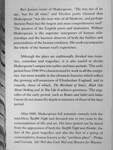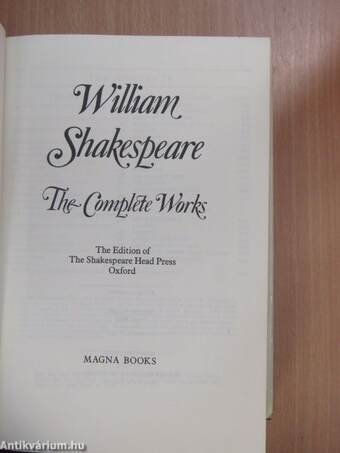1.062.356
kiadvánnyal nyújtjuk Magyarország legnagyobb antikvár könyv-kínálatát

VISSZA
A TETEJÉRE
JAVASLATOKÉszre-
vételek
William Shakespeare - The Complete Works
| Kiadó: | Magna Books |
|---|---|
| Kiadás helye: | Leicester |
| Kiadás éve: | |
| Kötés típusa: | Félvászon |
| Oldalszám: | 1.263 oldal |
| Sorozatcím: | |
| Kötetszám: | |
| Nyelv: | Angol |
| Méret: | 24 cm x 16 cm |
| ISBN: | 1-85422-063-2 |
naponta értesítjük a beérkező friss
kiadványokról
naponta értesítjük a beérkező friss
kiadványokról
Fülszöveg
Ben Jonson wrote of Shakespeare, "He was not of an
age, but for all time',' and Dryden justly claimed that
Shakespeare "was the man who of all Moderns, and perhaps
Ancient Poets has the largest and most comprehensive soul!'
The greatest of the English poets and dramatists, William
Shakespeare is the supreme interpreter of human rela-
tionships and the keenest observer of both the frailties and
potentialities of the human condition. His work encompasses
the whole of the human soul's experience.
Although the plays are traditionally divided into histo-
ries, comedies and tragedies, it is also useful to divide
Shakespeare's output into earlier and later periods. The early
period from 1590-99 is characterized by work in all the catego-
ries, but most notably in the chronicle histories which reflect
the growing self-awareness of Elizabethan England, and in
comedy, three of which, The Merchant of Venice, Much Ado
About Nothing and As You Like It achieve greatness. The... Tovább
Fülszöveg
Ben Jonson wrote of Shakespeare, "He was not of an
age, but for all time',' and Dryden justly claimed that
Shakespeare "was the man who of all Moderns, and perhaps
Ancient Poets has the largest and most comprehensive soul!'
The greatest of the English poets and dramatists, William
Shakespeare is the supreme interpreter of human rela-
tionships and the keenest observer of both the frailties and
potentialities of the human condition. His work encompasses
the whole of the human soul's experience.
Although the plays are traditionally divided into histo-
ries, comedies and tragedies, it is also useful to divide
Shakespeare's output into earlier and later periods. The early
period from 1590-99 is characterized by work in all the catego-
ries, but most notably in the chronicle histories which reflect
the growing self-awareness of Elizabethan England, and in
comedy, three of which, The Merchant of Venice, Much Ado
About Nothing and As You Like It achieve greatness. The trag-
edies of the early period, such as Romeo and Juliet and Julius
Caesar, do not attain the depth or intensity of those of the later
period.
After 1600, Shakespeare left romantic comedy with the
matchless Twelfth Night and devoted one or two years to the
contemplation of life and art. His later period can be dated
from the appearance of both the Twelfth Night and Hamlet, the
first of the great tragedies and also the first of a group of
contemplative dramas known as the "problem plays" - Troilus
and Cressida, All's Well that Ends Well and Measure for Measure.
When the tragic hero next appears in Othello, the appeal is
much more directly emotional than in Hamlet and this impas-
sioned conception reaches titanic heights in King Lear and
Macbeth, where relentless and malignant destiny works
against frail man, and the awful logic of the action is urgently
communicated in language impassioned and intense. At the
end of the later period, with the exception of the historical
Henry VIII, written with Fletcher, are Shakespeare's dramatic
romances which draw on the musical and spectacular ele-
ments of the popular Court masques. Of these, The Winters
Tale and The Tempest are marked with the greatness that only
Shakespeare could achieve.
In Shakespeare language, thought, action and character
form a dramatic unity which is at once natural and poetic,
unique and infinitely creative. Each age has been able to find
in Shakespeare a mirror reflecting its own dreams and aspira-
tions, its own frailties and faults. In the comedies we are
aware of the mutability of human affairs. The histories,
informed by a sense of political morality, present a vision of
the commonwealth cursed by violence and anarchy, of which
Falstaff becomes the principal symbol, until Henry Tudor
redeems the original sin of regicide. The tragedies as well
reflect this sensibility and also a concept of justice absolute.
The conflict between justice and mercy is a notable feature of
all the tragedies and is resolved finally in Coriolanus, when
the hero spares Rome and thus triumphs over himself. Chaos
and anarchy again appear in the later romances, but there the
emphasis is on reconciliation and regeneration. In them
Shakespeare finally looks towards the harmony and unity of a
Golden Age, becoming almost mystical, something which
had previously been seen only in some of the sonnets.
This edition of the Complete Works is a facsimile of the
definitive Shakespeare Head edition published originally in
Oxford, England. Vissza
Témakörök
- Idegennyelv > Idegennyelvű könyvek > Angol > Szépirodalom > Dráma
- Szépirodalom > Versek, eposzok > A szerző származása szerint > Európa > Nagy-Britannia
- Szépirodalom > Dráma > A szerző származása szerint > Európa > Nagy-Britannia
- Idegennyelv > Idegennyelvű könyvek > Angol > Szépirodalom > Versek, eposzok > Egyéb
- Szépirodalom > Dráma
William Shakespeare
William Shakespeare műveinek az Antikvarium.hu-n kapható vagy előjegyezhető listáját itt tekintheti meg: William Shakespeare könyvek, művekMegvásárolható példányok
Nincs megvásárolható példány
A könyv összes megrendelhető példánya elfogyott. Ha kívánja, előjegyezheti a könyvet, és amint a könyv egy újabb példánya elérhető lesz, értesítjük.








